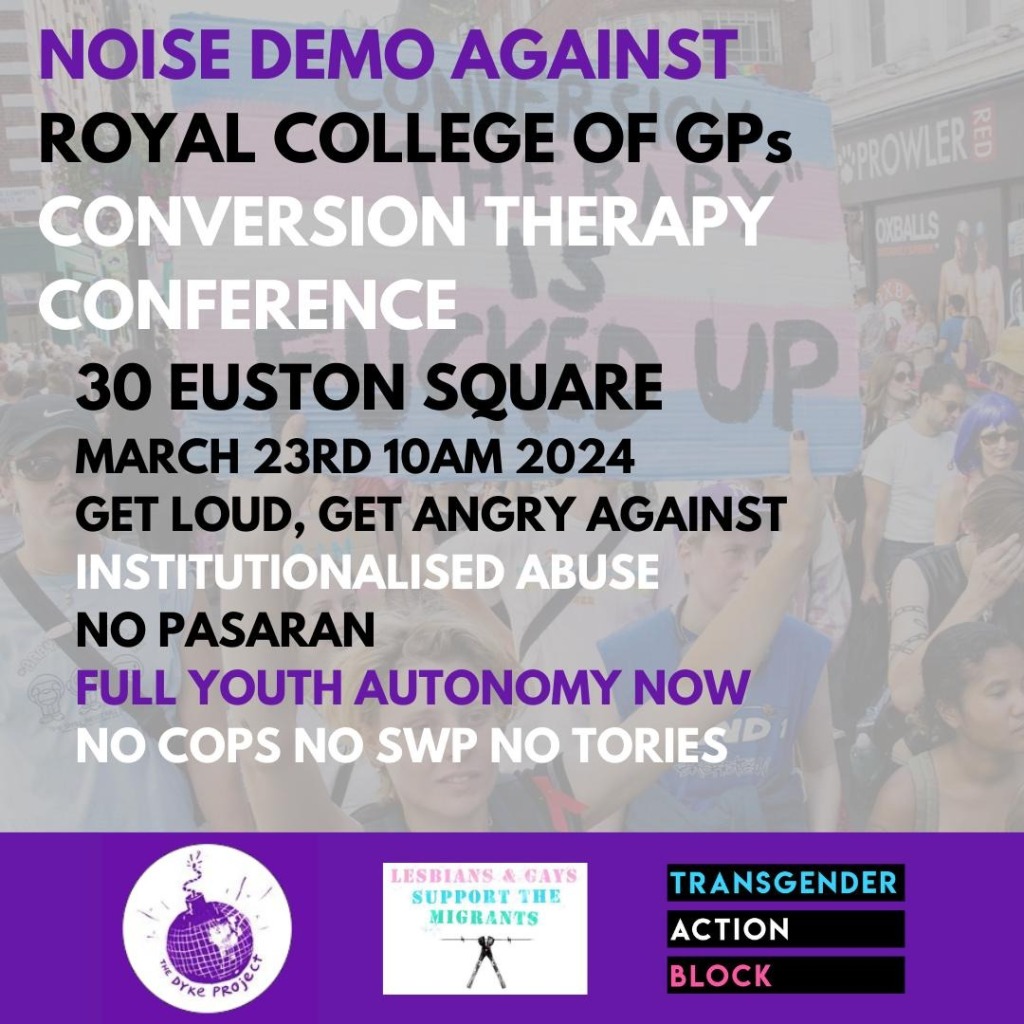On Saturday 23 March the Clinical Advisory Network on Sex and Gender (CAN-SG) are hosting at conference at 30 Euston Square, the headquarters of the Royal College of General Practitioners. CAN-SG are described by Trans Safety Network as “an organisation composed mainly of activists involved in the pseudoscience network SEGM, and the anti-trans conversion therapy campaigning body Genspect“.
A noise demonstration will be held outside the conference venue from 10am on 23 March, hosted by Transgender Action Block, Lesbians and Gays Support The Migrants, and The Dyke Project.
According to the Memorandum of Understanding on Conversion Therapy, an agreement signed by 40 leading professional bodies and healthcare providers, conversion therapy “is an umbrella term for a therapeutic approach, or any model or individual viewpoint that demonstrates an assumption that any sexual orientation or gender identity is inherently preferable to any other, and which attempts to bring about a change of sexual orientation or gender identity, or seeks to suppress an individual’s expression of sexual orientation or gender identity on that basis”. Conversion therapy has been described as a form of torture in academic work and by UN experts.
The CAN-SG event speaker lineup is a who’s who of conversion therapy proponents and anti-trans activists, including:
- Stelley O’Malley, founder and director of Genspect, who has described seeking to suppress the gender identity of teenagers in her therapeutic work, adding: “I don’t think you should have empathy or sympathy” for young trans girls.
- Michael Biggs, an anti-trans campaigner linked to a prolific troll account on Twitter.
- Richard Byng, a member of anti-trans pseudoscience network SEGM.
- Rachel Cashman, a campaigner against trans inclusion in schools, and supporter of Women’s Declaration International (WDI). Under their former name of Women’s Human Rights Campaign, WDI have openly called for the “elimination […] of the practice of transgenderism”.
- Az Hakeem, a member of Genspect and an active opponent of a proposed legal ban on conversion therapy. Hakeem was reported for conversion therapy to the GMC by a former patient.
- Anne Hutchinson, who has promoted materials by Genspect in training for South London and Maudsley NHS Mental Health Trust.
- Riittakerttu Kaltiala, a Finnish clinician and opponent of affirmative care who contributed evidence for Florida’s ban on medical transition for young trans people. I have not found any evidence that Kaltiala opposed Finland’s policy of forced sterilisation as a condition of legal recognition for trans people, which was repealed only last year, but am willing to be corrected on this. According to a recent academic biography, Kaltiala sits on the advisor board of the Cass Review.
The Royal College of General Practitioners (RCGP) are signatories of the Memorandum of Understanding on Conversion Therapy. Signatories agree that conversion therapy is “unethical and potentially harmful”, and commit to ending this practice in the UK.
Following complaints from LGBTIQ+ groups and their own members, the Royal College of General Practitioners (RCGP) released a statement saying that the conversion therapy conference would go ahead. In the statement, they argue that their headquarters building, 30 Euston Square, is “an event space run by an independent events company”. However, the statement opens by saying that the RCGP has “reached the decision that the Clinical Advisory Network on Sex and Gender (CAN-SG) conference can go ahead”, and later adds that “the College would be at risk of being faced with a claim for breaching the Equality Act if we acted otherwise”. This implies that the RCGP do, in fact, have control over their own building, and have taken the active decision not to oppose the conference.
Legal threats are increasingly common from anti-trans campaigners, who argue that cancelling contracts or events constitutes an attack on their “gender critical” views as “protected beliefs”. The CAN-SG conference has been widely reported as a gender critical event, and indeed several of the speakers appear to describe themselves as “gender critical”. However, the issue with the event is not the beliefs of the speakers or organisers in and of themselves. It is that they are actively promoting disinformation and harmful practices.
The RCGP’s position is therefore one of gross cowardice, and demonstrates that they are not actually committed to preventing harm against trans people in healthcare settings. It costs the RCGP very little to sign a document claiming that they oppose conversion therapy, or condemn the UK government for failing to introduce a legal ban. However, now that the fight against conversion therapy has come to their door, they are not prepared to act.
It is within the power the RCGP to ensure that the CAN-SG conversion therapy is cancelled. They have chosen not to do this. It is within the power of the RCGP to oppose CAN-SG in court, if it came to that. They have chosen not to.
This reflects the same failures we have seen from bodies including NHS England and the Cass Review. I am often asked why trans people do not trust doctors. This is why. We are failed by medical professions over and over again.
Change happens not because powerful organisations allow it, but because ordinary people fight for it. A true commitment to ending conversion therapy can be seen not in the actions of RCGP, but in the work of groups like Transgender Action Block, Lesbians and Gays Support The Migrants, and The Dyke Project. I am also hugely grateful to grassroots organisations such as Trans Safety Network, Health Liberation Now, and Gender Analysis for gathering a lot of the information I collated in this post.
That power also potentially lies with you. Trans support groups and harm reduction networks for people self-medicating can be found across the UK, and will always benefit from your support. And you can complain to the RCGP here.



